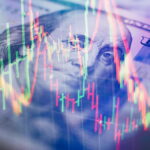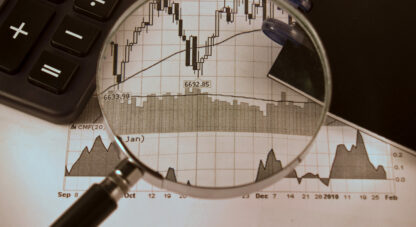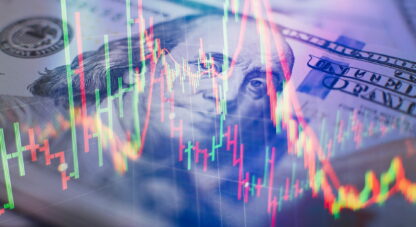The McAlvany Weekly Commentary
with David McAlvany and Kevin Orrick
“Will the free market ever exist again? Will reality ever return again? The answer, on today’s program, is a resounding yes. And how to prepare for the dissolving of this current matrix is the key to the discussion.”
– Kevin Orrick
“We know that life is full of ebbs, it’s full of flows, it’s full of ups and downs. And I’d rather my children understand uncertainty, learn to choose courage in the face of adversity, than live in some mock reality designed by over-indulgent parenting. And I think, frankly, Fed policy is that same sort of over-indulgence for the investment community. It’s like, “You can do no wrong.”
– David McAlvany
Kevin: Just before we even start, Dave, let’s remind the listeners that you and your dad are going to be doing a whistle-stop tour of a number of cities, and we really would like our listeners to come see you live.
David: I can’t tell you how much fun it’s going to be to be on the stage with my dad. We have very different personalities, but very complementary themes, and the dynamic should be really fun. I have learned so much from him, starting when I was three years old, and to be continuing to learn from him and complement what he does – we enjoy our time together and you won’t want to miss July 14th and 15th in Palo Alto, July 19th and 20th in Agoura Hills, California. And then we go on from there to July 25th and 26th in Bellevue, Washington. The 28th and 29th in Portland, Oregon. Scottsdale, Arizona on August 1st and 2nd. And August 8th and 9th, we wrap up this particular leg in Denver.
Kevin: And just to mention, for those who are further east than Denver, you are going to be doing this again in late October, early November. Is that correct?
David: That’s right. We start on the West Coast, and then in the fall we will head toward the East Coast.
Kevin: And Dave, we do ask people to call 800-525-9556, ask for extension 118, to sign up, just to RSVP for the conference.
David: If you RSVP, we know how much food to have there at the venue. And just so you know how those dates flow, the first date is the meeting date. The second is where we will be doing individual consultations.
Kevin: Private consultations – no charge.
David: That’s right. So, if you are interested in what Don’s thoughts are on the changing landscape here in the U.S. politically, and geopolitically around the world, the implications that has for the financial markets, the best opportunities and most attractive asset classes of 2017, where you should be and need to be – boy, you just don’t want to miss this.
Kevin: Well, as often is, Dave, you are coming back from an adventure with your kids. In this region of the West, the rivers flow so differently this time of year because the snowpack, the snowmelt, is so heavy that the rocks that you would normally see in a river, the trees that you would normally see in the river , and hopefully not the people you would normally see in the river – they are all covered by this massive liquidity flowing at huge cubic feet per second.
David: Every year we try to get out to the Colorado River once or twice and float the river on rafts by Moab.
Kevin: That’s in Moab, Utah that you do that, right?
David: That’s right. Moab, Utah. It is hot as can be, and you’re glad to be in the ice cold.
Kevin: But the river is cold.
David: That’s right. You’re right, everything changes with volume, and you ordinarily do see certain outcroppings, and we have our favorite beaches. They’re gone, right now, with the flow at 30,000 cubic feet per second, which is pretty high. It’s the highest we have ever been on in that stretch of the river.
Kevin: And you took your 11-year-old, your 9-year-old, and your 6-year-old? So you guys were all paddling just to be able to keep up, weren’t you?
David: What is interesting is that the flow is incredibly fast, and yet we had this massive headwind. And so, it just creates all of these interesting dynamics that you can’t necessarily anticipate. Ordinarily when a river is running that fast, it is fairly predictable. You put in here, you get out there, and you go very fast. But with a headwind, we actually had stretches of the river where, with all our might, we were rowing just to go downstream. Again, highest we have ever been in the river, fastest flow ever, and yet we were at a standstill. In fact, on my paddleboard, I had an easier time going upstream than downstream because of the wind.
Kevin: As I think about this, we have been in a strange period of time this last eight years or so since the financial crisis. Just like we talk about the river, where if you are on a river, or even a lake, like Lake Powell when it is high, you don’t recognize any of the beaches or the rocks. Things change. In fact, you can’t really make decisions based on the way you were making them when the river was running at normal levels.
David: What is your point of reference?
Kevin: Exactly. So, what I’m likening this to is, there has been a sea of liquidity that has been produced. You have talked about this for years, Dave, since the financial crisis that we have. It’s almost like water behind a dam that has just been created in the form of monetization, low interest rates, trillions and trillions of dollars. And it is creating an illusion of equilibrium in the market, because there is liquidity everywhere, so you have it flowing.
I’m thinking about these ETFs and these index funds that you have been mentioning the last couple of weeks where you have four or five stocks, the FANG stocks – Facebook, Amazon, Netflix. These stocks are controlling the entire market, but in a way it is caused by this massive liquidity that shouldn’t actually be there.
David: When we spoke of cap-weighted indexes and the way that ETFs have driven unreasonable amounts of money into the largest companies in various indexes, the point of concern was, and is today, that only a few names are responsible for the direction of the entire index. Just a few companies are driving the indexes higher.
Kevin: And it can go either direction. Look at Friday. I’d like to talk about that sometime in the program because Friday we saw that it can actually go the opposite way sometimes.
David: That’s right. When it is going and it is working to your advantage, that’s the direction that people like, but the unhealthy dynamic is that it takes only those few names to slay the market. When we have criticized the current trend of autopilot index investing it has been because there is not enough discrimination between individual companies. And that is what needs to occur. Fundamental analysis has become less relevant, and it needs to become more relevant.
Kevin: But that’s not the way. The new way, Dave, is not analysis, it is just, “Let’s go the Vanguard way.”
David: So the result is that stock selection is out of vogue now, and that is in contrast to sort of the Vanguard way, knowing your dollars are just going to be a part of the desired investment theme via an index. It is fundamental analysis and company-specific research that you pay an asset manager for. That extra deep dive into particular companies is what has fallen out of favor.
Kevin: I think that people will find out what the river really looks like when the water drops. It takes an expert at that point. The difference of just what you guys did this weekend, not to take anything away from it, but anybody could put in when it is flowing 30,000 cubic feet per second and they’re going to flow over everything. But when the river normalizes, you need somebody who is an expert steersman. Your three little kids would not have been able to do that at that time.
David: That’s right, no doubt. So it is fascinating to watch how clients in this particular period of time – not ours, per se, but just the general wealth management client out on the street – have put their manager to the firing squad in recent years, because frankly, management of risk via fundamental comparisons between companies hasn’t yielded much.
Kevin: They’re like, “Hey, there are no rocks. I don’t see any rocks. I don’t see any trees. Everybody is just flowing down the stream. Why do we need you?”
David: Right. So the asset manager says, “Yeah, but volumes aren’t always this high and you have to know how to navigate. You have to know where to go to avoid this eddy, and to get here, and to not get stuck there, and to not be thrown up and pinned against this wall.” There are skills that are no longer relevant because the flow is so high. The easy money since 2009 – that has really been made. The easy money made has been in indexing. And now people believe, since 2009, that this theme will continue forever, that you don’t need a thoughtful process. That is what we talked about last week. And this is the primary point here. The index gives, and the index takes away. It was giving disproportionate amounts of capital to a few select names, and it takes away disproportionately, as well.
Kevin: If we’re on a river, we can predict when the snowmelt is just about gone. By the first or second week in July that river really drops pretty dramatically. But this is different. We have had this river flow, really, since about 2009. This has propelled the market, Dave – this has got to be one of the longest-running market rises in history.
David: We were very active, that is, the Federal Reserve was very active in their quantitative easing program, several iterations of that up until 2014, and the heavy lifting has largely been done by the Bank of Japan and the ECB. So we passed the monetary baton, so to speak, to them. They’ve been running with it, and there has been ample liquidity in the financial markets globally as a result. But we now have a rate rise this week and the anticipation of more to come in light of, “Is this a recovering economy?” We have had almost uninterrupted moves higher in the stock market since 2009, and this is now the third-longest trend in stock market history. But curiously, it is linked to the weakest economic recovery on record. Just let that sink in, because on the one hand, stocks are going gangbusters…
Kevin: GDP has been 1.35% for a decade.
David: Real economic activity has not been supporting it. What has been supporting this non-differentiation between assets is a massive liquidity flow.
Kevin: And not only that, but things seemed to change, also, when Trump came in. We had that Trump rally that went for a couple of months after he was elected.
David: So since 2009 and since the Trump election euphoria in the market, since February the stock market began to stall, as we said, moved sideways – since, since, since.
Kevin: Right. But with last week’s recording we had not seen a major down-move on those FANG stocks, and my gosh, it hit with a passion. You had Amazon over a 1000 points dropped down.
David: Fluctuating down almost a 100-point range.
Kevin: Yeah, it dropped down into the low 900s.
David: I was encouraged. I was encouraged on Friday.
Kevin: Right, because the market showed itself to be market.
David: Exactly. I say encouraged – it was an ugly day for tech. But what was encouraging to me was a brief interlude where I had the distinct impression that the markets were not entirely rigged (laughed). That’s encouraging to me. That’s right. No news, no announcement. You had the rotation from mega-tech to value stocks, and that caused an instant and unstoppable hemorrhaging in the most popular names in tech.
So it was interesting, Monday Bloomberg writes that the Friday decline in the NASDAQ index was largely driven by five names – 75% of the decline on Friday was attributable to Apple, Microsoft, Google (which they now call Alphabet), Amazon and Facebook. These are the companies that were driving 75% of the NASDAQ’s decline, which gets to my point. The indexing theme feels good on the way up, but actually, you have concentrated positions where volume gets sucked out just as quickly and the whole index suffers as a result.
Kevin: And lest you sound like somebody who just wants to see the stock market lose, that’s not true. But you are a free market guy, and what we have lamented over the last few years is that as the central banks continue to add liquidity, everywhere there might be a decrease in market price, they have covered up all the dangers and made people feel like, “Hey, this is just going to be an easy river trip for the rest of our lives.”
David: That’s right, I’m a free market guy, plain and simple. And when the stock market goes down this is not Dave’s demented schadenfreude (laughs). I derive no pleasure from other people’s pain. But again, I like mistakes, and I like errors of judgment. I like arbitrage, and I like opportunity. And I like it when someone misreads the market, because it means you can actually position yourself on the other side of the trade.
Kevin: Well, you use critical thinking skills to try to profit, or preserve your assets.
David: As a group, we look at economic fundamentals. We believe they are relevant to an investment equation. The reality is, in a period where the liquidity is flowing at a very high level – in fact, a record level – those distinctions really don’t matter. Believe it or not, we still are that group of people that place a lot of value on an individual company’s positioning within a peer group. It’s not just about an index exposure. Indexes have their place, but it can’t be the sum total of an investment strategy.
Kevin: But the market has always been built from the bottom up. That’s what a market is. It is individual actors, agents acting in their own favor, but granted, it creates this beautiful thing called the free market. What has happened since the financial crisis is, top-down management has decided that if we can print money – the Federal Reserve, the ECB, the Bank of Japan – if we can print money, and we can add liquidity to that river, you don’t have to make decisions.
David: Right. Then there is the market’s movements, which on a day like Friday run contrary to design and contrary to the top-down economic management. When I see movements like that, refreshingly, I think, the markets are not solely driven by trillions in central bank liquidity. The markets are not entirely engulfed in a twilight zone reality where nothing matters except Fed-induced speculation and what comes from that asset price appreciation. It gives me a glimpse – even if it is just for a day – it gives me a glimpse of the market operating independently of the Treasury, independently of the Fed, independently of the Plunge Protection Team and their various high-frequency trading partners, engineering liquidity flows to areas in the market that need stabilization.
Kevin: And I want to repeat, you don’t want to see people necessarily lose money, but if they’re making bad decisions at this point, that are based on false liquidity, that is going to happen.
David: Right. Yes, I think this makes sense. I’m not happy when individuals lose money in a stock market decline, and I do not delight in other people’s pain or suffering. I am happy that there are normal ebbs and flows in the market based on uncertainty and imperfect information, and distinctions of good and bad business models. And it’s okay to see bad businesses go out of business instead of being alternatively subsidized by easy money policies.
Kevin: Do you remember when you were interviewing Russell Napier a couple of years ago, and he was realizing he had studied, his entire life, the free markets. He loves the free markets. If you haven’t read his book, I would encourage every listener to read his book.
David: The Anatomy of The Bear. It’s a classic.
Kevin: He went back and analyzed how the free markets handled the stock market crash in the 1920s, and how we got there. It was brilliant. But do you remember how deflated he was when you asked him the question, “Russell, how do we navigate the waters right now, with the central bankers intervening like they are?” He said, “What you need to do is study command and control economies. Study how the Eastern Europeans have done it up to this point.” For a free market guy to actually acknowledge that this thing is being command and controlled instead of free markets, it’s like throwing all the markets out.
David: And it becomes surreal and discouraging when markets take on those command and control dynamics and move, not to the beat of their own drum, but according to grand orchestration, put in motion by politicians, and of course, helped by bankers and sort of the Wall Street and high-frequency trading minions. A one-way bet is not a market.
So when you look at a real possibility of loss, when you look at crisis, when you look at bankruptcy, and you set that against the real possibility of gain, and success, and growth in market share – that’s what keeps a market a market. Greed and fear are these two balancing factors critical to the ebbs and flows of the marketplace. When only one of them exists, more or less by government direction or influence or control, then investing is no longer a thoughtful process, and there is no value in analysis. It’s just another extension of financial capture.
Kevin: Do you remember Carmen Reinhart last fall, when we were talking to her she said that for them to maintain this system from here on out, they are going to have a create a captive audience. You’re going to have to be locked in somehow.
David: And I know that financial repression and creating a captive audience have very specific connotations. But I think there are multiple ways of creating a captive audience, or corralling it, as Carmen Reinhart described it. When you rig the markets and create an interesting enticement for investors, a one-way bet, a guaranteed win, what you are doing is altering the perceptions of risk in the marketplace and making the invite just inescapable. You have to say yes.
Kevin: So, when you are raising your kids, and when I raised my kids, there are things that you want them to be aware of that are dangerous. If all you do is give them guaranteed success in every endeavor – you make sure that they always catch the ball, you make sure that you always praise them whether they win or lose, what happens is you start building a false sense of reality. And when those kids get to be adults, unfortunately, the reality of life does hit.
David: And you realize they may have been prepared very well to be significant and robust individuals in their own minds and in their own hearts, but the rest of the world doesn’t have the same appreciation for them that they have of themselves. You are right. This guaranteed success in the marketplace – if you have a guarantor of success in the marketplace, in a sense, it is like that paternalist role overplayed where a child doesn’t know defeat, doesn’t know loss, doesn’t know disappointment, and always reaches their goals.
You’re right – the child that is always a winner, always special, always a success, really because of helicopter parenting – we know that life is full of ebbs, it’s full of flows, it’s full of ups and downs. And I would rather my children understand uncertainty, learn to choose courage in the face of adversity, than live in some mock reality designed by over-indulgent parenting. And I think, frankly, Fed policy is that same sort of over-indulgence for the investment community. It’s like, “You can do no wrong.
Kevin: Dave, it was a real pleasure about six weeks ago, when we had some listeners who had driven down from Canada, and just on a whim they decided to try to see if one of us were here. And I got a chance to sit down and meet with them. What a beautiful family they had. It is amazing. But the father, who listens to the podcast every week, is very much into training his children, just like you do, in investing, and they had all taken assets that they had gained through work, through investing – what have you. And they had various investments that had risen, various investments that had fallen, and some that had completely failed.
I remember, as a family, sitting here in this room – we were just talking things through, and the kids were talking about what they had learned through failure. The father, who listens every week, could have easily bailed them out. Some of these were fairly significant investments for these young kids. But he didn’t. I could tell he was savoring the lesson that they were learning through free markets and failure.
David: Investing is a series of calculated bets. And it is bets on outcomes that you believe have a greater probability of coming to pass. When the investment landscape has collapsed down to a single dimension, as central bank policy has done, it is no longer a market. Everyone may be happy with that in the present moment because, frankly, it brings us record household wealth. If you look at the stats today, we’re breaking all records. Household wealth relative to GDP is the highest of all time. And so, there is a part of us that says, “Well, I’m happy with that.” It looks good. It feels good. But it is a controlled reality.
Kevin: This reminds me, Dave. I was with your dad during one of the conferences that he was doing back in the late 1990s. I was with Scotty, your brother, and a couple of the guys here at the office. It was a night off and we decided to go to a movie. Well, there just happened to be a movie we had never heard of playing there in Pittsburgh when we were on the road, and it was called The Matrix. And I’ll never forget the discussion that we had in the car going home because The Matrix is all about that. The Matrix is all about providing an artificial comfortable reality, but it is not. It is sucking the life out of every person who is a participant.
David: The Matrix tells a story of people who gladly are joined into a system, and they are being tapped for all their energy as the equivalent of docile batteries. In fact, the mockery of the guys who are outside of the system is that they call everyone who is inside the system “coppertops.”
Kevin: Right. But they have the illusion of autonomy. They have the illusion of freedom. But it’s not there.
David: But there is no freedom. There is no autonomy. Each living corpse is fed an algorithm, that takes the catatonic body and gives it mental impressions of bliss. It creates a virtual world where you can have everything you want without pain. There is no suffering, or the tensions which exist in the real world. There is only risk if you unplug from the system. It’s a one-side experience which is so satisfying that you dare not question it at all. You have robots, you have computers. Basically, this is a dystopian idea of artificial intelligence which has solved the sustainability issue, and they have come up with a solution. Deaden the human spirit’s drive for freedom by providing all the wants that an individual can imagine, that you could ever long for.
Kevin: That is the false success that you are given.
David: Create a simulacrum. Create a representation. Create an image. It’s almost real. It’s a copy (laughs) – this is going to post-modern philosophy – a copy without an original. That’s the idea of a simulacrum. Then direct the energy flow from all those coppertops, all the collective, the way that you choose. So passivity – this is really key – passivity is central to being controlled, and maintenance of equilibrium by any means – that’s just a characteristic of the deal.
Kevin: There was a fighter pilot back in the 1950s, a guy named Boyd, who actually was the teacher of the top gun schools from that point forward. The guy had a reputation not only of shooting down the enemy, but when they would simulate dog fights, these students, everyone tried to beat him, but no one could beat him. In fact, everyone tried to beat him, but he had a record that had never been broken that he shot down any of his opponents in less than 45 seconds. Now, he had a saying. He said, “You’re only in equilibrium when you’re dead. Otherwise, you’re continually orienting.”
David: But the fascinating thing – this ties directly in to the financial market management that we have today where everyone thinks that they want equilibrium because it represents non-vicissitude. It represents non-challenge. It represents the equivalent of peace and prosperity – non-volatility. Non-volatility!
Kevin: “We just want comfort.” The Volatility Index is something, Dave, that you have pointed out many times. When the Volatility Index is low that means that people are asleep. They are moving to equilibrium, but not orienting.
David: Right, which as Boyd said, equilibrium is the same as death. This is a long way round of saying that on certain days there doesn’t seem to be free markets anymore. And when the unexpected and uncontrolled occurs, it is refreshing because the markets indicate that they still have a pulse, or even maybe a mind of their own?
Kevin: Before the drop on Friday, look how low the Volatility Index had dropped. People were absolutely asleep at the wheel.
David: That morning the VIX reading was 9.37 – that was just before the tech price roiling – and that’s a level of market confidence, if you look at it, perhaps, the way we do – complacency not seen in 23 years.
Kevin: But that reversed very quickly, and that is when Amazon and these other stocks fell. What was the trigger? Was it Goldman-Sachs coming out and warning people about the five mega cap stocks? What was it?
David: They had an observation that five mega-cap stocks accounted for 55% of the NASDAQ rally since the beginning of 2017. Bloomberg, as we mentioned earlier, attributes 75% of Friday’s NASDAQ volatility to just five companies. So was it a Goldman reality check that had investors rethink their – what is it? It looks like a bliss-filled, mindless investment strategy. Or was it Mizuho Securities’ downgrade of Apple? Was there a trigger that caused investors to question what has been unquestionable, which is this dynamic march toward perfection? For years the race has been, for many of these companies, to get to a trillion-dollar market.
Kevin: Apple is getting close.
David: 800 billion. It’s nearly there.
Kevin: So, we talked about a sea, this river, of liquidity, but it’s not just the United States that is producing it. We have the European Central Bank, we have the Bank of Japan. These guys are all trying to play their part in making sure that this thing is sustained.
David: The numbers are so large. We have a problem today. The numbers are so large that they don’t matter anymore.
Kevin: Once you say a trillion, people just tune you out.
David: It doesn’t matter if it’s a 1-trillon dollar number or 100-trillion dollar number – it’s gobbledygook. Sometime sit down with a child under ten and say something about two hundred thousand dollars. And you won’t see any difference in their surprise between two hundred thousand and two hundred million or two hundred billion or two hundred trillion. And if you explain to them that the national debt is two hundred thousand dollars and we’re doomed, they will have the same response as if you say, “Actually, our long-term obligations, according to Larry Kotlikoff at Boston University, are north of 220 trillion dollars.”
Kevin: Right. It’s meaningless.
David: It’s meaningless, because it’s a big number.
Kevin: But you’re talking about your kids. Dave, it’s no different with adults. We can’t conceive of those numbers.
David: (laughs) We know that asset prices are floating higher on a sea of liquidity. As you say, it’s the ECB, it’s the Bank of Japan, it’s other central banks, navigating channels of least resistance into the financial markets. And that’s how liquidity flows. It finds the channel of least resistance and it goes there. That is the nature of the bull market dynamic since 2009. You have Michael Hartnett from Bank of America who pointed out this last week that central banks are still very active in the markets. Now, this is curious because what it used to mean is that you provide liquidity to the markets…
Kevin: When needed.
David: And then you have actors out there who take the liquidity and on reasonably cheap credit terms, borrow and invest, or do whatever they are going to do with it. What Hartnett is talking about is not providing liquidity, he is actually talking about the buying footprint of the central banks.
Kevin: The central banks are buying the stocks – and the bonds.
David: Year-to-date, 1.5 trillion dollars in assets have been bought by central banks. If you do the math, that is 300 billion dollars a month in artificial buying.
Kevin: Dave! 300 billion, that’s three times the amount of monthly buying that we were doing when we were at the peak of our quantitative easing. Well, Dave, the central banks, obviously, are just printing money to buy these stocks, but if they actually had to take it in in tax revenues, let’s compare it to, say, U.S. tax revenues. If the United States decided, with only tax revenues, to go in and buy the same amount of stocks, that would take it all, wouldn’t it?
David: Right. Central banks today, buying assets in the open market – this is artificial buying that we are talking about – are spending the equivalent of more than 100% of all federal tax revenue.
Kevin: Just to buy stocks. And bonds. Just to maintain this illusion of high water.
David: So, the market appears to be a one-way bet, and it appears to be a one-way bet with artificial demand in place. The ECB complained last week that, actually, they have a new problem. The problem is they can’t find enough German bonds to buy in order to keep the rates low and the recovery in Europe on track.
Kevin: Recovery – they call it a recovery when they are having to buy 300 billion dollars a month?
David: Well, is that a recovery? Is this a reality we are in, or some sort of financial version of the matrix? Think of this. Junk bond yields in Europe hit a record low, just in the last few days, of 2.59%.
Kevin: (laughs) This is a junk bond.
David: This is junk bonds in Europe! That’s in line with U.S. treasury yields. You tell me – what could go wrong when debt is priced that way? We have credit risk, we have inflation risk, we have duration risk. We have all of the risks in the junk bonds of European companies and they are priced as if those risks are non-existent? Really? What could go wrong?
Kevin: Right. Going back to The Matrix, the movie. There was a guy who did come out of this comatose state. His name was Neo. He was the hero of the show. What happens, Dave, when people come out of this comatose state?
David: The system tries to kill you (laughs), because it is very upsetting that you could somehow change the perception as to this altered reality. It’s not an altered reality – it is reality. That’s all you need to know. Forget everything else. You’ve been plugged in.
Kevin: Money does grow on trees – forget what you were told as a child.
David: So, back to the markets. Either the markets are dead, or there will be an awakening from a comatose investment community. You look at the central bank drug of liquidity, and when it wears off, what you have is pain emerging – the pain of neglecting reality for too long. And I’m not suggesting that reality is painful in itself, but if you neglect reality long enough, it seems almost intolerable on a relative basis. Think about your sugar blues. Think about your caffeine blues. A return to a baseline after a euphoric high makes the baseline seem depressing by comparison.
Kevin: Well, are investors starting to sense that there is a reality? Friday may have been an example, at least, of a little twitchiness, don’t you think?
David: I think it’s a twitch – it’s not an awakening. Investors’ sense of reality, a real baseline, has been so toyed with and manipulated, that it begs the question – can central planners even allow for a return to normal?
Kevin: But the European Central Bank has been talking about – we see the word in quotations – “normalizing” rates. You know, we had this interest rate rise this week here in America. Normalizing rates – can they actually do that?
David: To me this boils down to, what is the greatest fight of the 21st century? It is between command and control dynamics, where we have models that tell us we can create a perfect world – our version of a financial utopia – and that runs in conflict with the free markets.
Kevin: Even if it defies the laws of physics?
David: But isn’t it more appealing to have utopia than deal with the vagaries of the market? And what they are offering, really, is the assurance of a verbal guarantee in exchange for the risks that come with freedom.
Kevin: It’s the false religion of perpetual growth that Tomas Sedlacek told us about. These central bankers are high priests of a false religion of perpetual growth which never has existed in history.
David: So the ECB talks of normalization. There is no rocket science here. If they quit buying the assets they have been buying, or the Bank of Japan does the same, and the artificial buyer in the market disappears…
Kevin: Which is what normalization is supposed to be.
David: Do real buyers appear instead? Do prices levitate in the absence of buyers? Simply put, what this suggests is that we have significant price upheavals around the corner. Weird things are happening. Very weird things are happening, beyond the manipulated prices where junk bonds in Europe trade at U.S. treasury prices. That is weird, but not really weird. And I think what we are finding is that we are at the end of this sort of levitation experiment.
There are considerable air pockets that exist. I can think of five to seven different markets globally where you can see a 5, 10, or 25% decline in a matter of days, because of the air pocket that exists under current pricing. Look at the S&P index as an example, again, of just something weird. Through last Thursday, you had down-volume exceeded up-volume for eight out of nine days, sequentially. The market was still rising over that period of time, and yet down-volume was outstripping up-volume.
Kevin: And that was happening last week when you were doing the show, too, Dave, because you had 495 stocks that were going down, and five that were going up.
David: On a different topic – gold. It is now every day that I see something in the news, whether it is political or geopolitical, that makes me think, “I’m glad to own gold.” And I don’t care what the price is. If it’s up or down, that is the most trivial and ridiculous element of owning gold, and it should not even be in the equation. The merits, as a political and geopolitical hedge, will become more obvious over the next several years.
Kevin: Let’s just look at how the world has changed since Obama took office. Or, we can even go a little later than that – 2009-2010. The international relationships that were holding the dollar steady – the petrodollar complex. We were able to go off of the gold standard in 1971 under Nixon because Kissinger had seen to it that all oil worldwide, OPEC oil, would be purchased only in U.S. dollars. And so, in a way, we transferred from a gold standard to a petrodollar standard. But it made us reliant on Middle Eastern international relationships and oil.
David: And what it created was what we know as petrodollar recycling, where the revenues generated from the sales of oil to the United States were re-invested in U.S. treasuries and so, because of the trade imbalance between the United States and the Middle East, we basically had a built-in creditor for running budget deficits. So, you run a budget deficit and you have someone who is built in there to buy our debt. That’s pretty handy.
Kevin: But now we are sort of abandoning those Middle Eastern countries. We don’t need them anymore. We have plenty of oil.
David: Since 2009 you have the old relationships in the international community which are dead relationships – let’s say dying relationships, at a minimum. So, you consider the abandonment of the Middle East to its own struggles. Saudi Arabia, as of this week, is on the brink of yet another conflict, this time with Qatar. Why so many tensions? You do have oil price declines, you have a lowering of dependence between the U.S. and the Saudis, which does contribute to a general sense of insecurity for the Saudi royal family.
And then I think it is worth remembering that you should never underestimate the power of war to distract people from economic realities, and at that the same time, to unify them against external threats. So think about that. Starting a war, you think, “Well, is it to fight the bad guys?” Sometimes it is just the perfect art of distraction. We see it in the Middle East today. We are likely to see the same military engagements elsewhere on the globe.
Kevin: All of our lives, we have been, as a nation, a net importer of oil. And that was to keep the dollar sound. That was part of the petrodollar agreement. What I have heard is, we are actually now exporting huge amounts of oil.
David: Well, we changed the rules. In 2015 we reversed the export ban, which has encouraged drillers and frackers to even more feverishly bring new supply to the market because it is not as if it is going to flood the U.S. market.
Kevin: Well, what happens to the countries, though, that had protection from the United States, like Israel, Saudi Arabia. That area had protection from the United States based on the agreements that were dollar-supportive through oil.
David: It’s a dangerous time for Israel. It’s a dangerous time for the Saudi royals. It has been an extraordinary time for Iran, particularly with the support of the Obama White House. Consider this. Just in the last few days, consider the David Asher revelations. Under Obama, as the Iran nuclear deal was being put together, U.S. intelligence units investigating Iran’s terror financing network were systematically being disbanded, and their enforcement activities were shut down. So, it’s fascinating. He was interviewed by the House Foreign Affairs Committee last week. I just think it is an interesting context to hold gold. The merits that gold has as a political and geopolitical hedge – as I said, I think they are going to become more obvious over the next several years. Gold today – it’s under loved.
Kevin: In America.
David: It’s under-appreciated.
Kevin: In America.
David: It’s under-owned.
Kevin: In America. The rest of the world is buying gold, Dave.
David: But on the other extreme you have tech, which now makes up 25% of all S&P value. The S&P 500 – 25% of it – it’s all tech, that 25% is. And that percent indicates the end game for any financial sector. Financial firms fit the same bill in 2007-2008. You had the financial share of the S&P 500 getting above 25%, and it’s just too big. I think, if memory serves me correctly, you go back to 1979 and 1980 when gold was in its heyday, and gold shares, I think, got to about a 25% place, as a total market cap.
Kevin: So that should have signaled the end of the gold move at that time.
David: Absolutely. So on the other extreme from gold we have tech, and your indexes which are over-loved, over-appreciated, and over-owned, particularly the mega-tech.
Kevin: Well, you sometimes mention the fact that gold stocks may be under-appreciated, as well, right now.
David: It is my firm belief that the next significant spot for the minting of millionaires is in the mining space, particularly precious metals, specifically, the mining companies that have positioned themselves to survive lower commodity prices, and have tremendous leverage to move in the commodity price. You take a group like the Bailleres family in Mexico – 10 billion dollars in net worth today.
Much of their wealth comes from an exposure to the largest silver mine in the world, one of the second or third largest miners, gold and silver, in Mexico. And I would guess that their net worth as a family goes to being number one in Mexico over the next three to five years. What I am implying is, their net worth triples or quadruples in value. Why is that the case? They own the largest silver mine in the world.
Kevin: Right. And people are just ignoring it here in America right now. But let me ask you a question. We have a pretty good idea that gold bottomed out in December of 2015 at $1050, roughly. And we have been rising – we’re at a couple of hundred dollars higher than that, and the moving averages have all been rising, and so all indicators are that we are going to see a continuance of a rise. When do you think the public here in America – again, the rest of the world I’m not worried about because they’re buying, but here in America they’re not – when do you think public attention will click in? Is there a price?
David: I think one of the things that we have as a litmus test for a healthy economy is the stock market. So if the stock market, even if it is held there artificially high by these massive liquidity flows, the general public doesn’t care about that. All they look at is the price and they say, “Yippee! This is great! Happy days are here again.” So their interest in gold is none, as long as the stocks are doing what they are doing.
Real public attention, I think, comes back to gold when it breaches $1400 an ounce. Yes, you could see that at the same time the stock market is selling off, but incrementally, we have $1290 to $1300, which is a significant level for now. And we talked about Friday. We talked about this rotation from tech stocks to value stocks, and this massive volatility – 5 to 7 percentage point swings in some of your largest tech names in a day.
Kevin: Yes, people can take a trade in milliseconds these days.
David: What that was is the power of a rotation – the power of a rotation from tech to value. And just as tech can be sold off, as it was for a single day last week, and value was bought, it may buy value stocks in the U.S., it may buy emerging market stocks as a better value, or just gold as a real value in the market today. But rotation connotes choice, and choice suggests freedom. And I think, in that context, you will have some assets that suffer, while others surpass expectations. I think the surpassing of expectations – that describes gold in the years ahead.
















